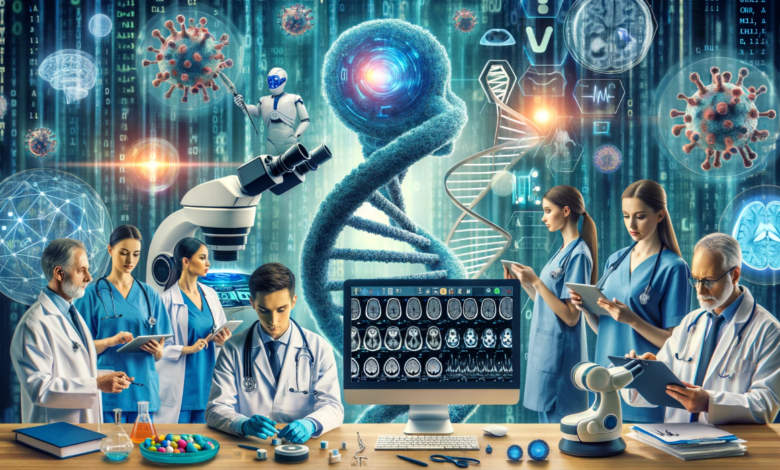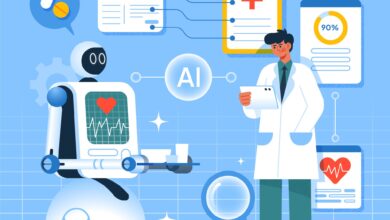
Over the past decade, AI has evolved from a supportive tool to an indispensable asset in the medical world. Beyond its roles in diagnostics, R&D and home health care, its impact on pharmaceutical marketing has been revolutionary. AI-powered strategies are enabling a nuanced, targeted approach like never before. By leveraging AI, pharmaceutical campaigns can map patient journeys, optimize content in real-time, and anticipate future drug demands based on predictive analytics. These capabilities are not just enhancing the effectiveness of marketing campaigns; they’re reshaping the very fabric of how the pharmaceutical industry connects with and understands its audience.
Let’s look at five areas where AI is having the biggest impact:
1. Diagnosing with Precision: AI in Medical Imaging
AI’s influence on diagnostic procedures is unquestionably one of the most transformative. Gone are the days of solely relying on the human eye to detect and interpret abnormalities in X-rays, MRIs, or CT scans. Today’s sophisticated AI algorithms can assist radiologists in:
- Spotting nuances: Minute changes and patterns, often overlooked, are easily detected.
- Reducing human error: Providing a secondary, automated review can filter out human biases and fatigue-related mistakes.
- Accelerating diagnosis: Quick scans and interpretations allow for faster and more efficient patient turnover.
One striking example is Google’s DeepMind, which can detect over 50 eye diseases in scans, often with a higher accuracy rate than human specialists.
2. Home Health Care: Robots and Virtual Assistants
The increasing elderly population, coupled with the ongoing healthcare staff shortages, has opened a pathway for AI-driven home health care solutions. The innovations here are two-fold:
- Robotic caregivers: These AI-driven entities can assist in daily tasks, medication reminders, and even basic health monitoring. Products like the Toyota Human Support Robot exemplify this, helping physically challenged individuals lead a more independent life.
- Virtual Health Assistants: Smart home devices, equipped with advanced AI, can now provide medication reminders, book doctor appointments, and even offer basic medical advice. The advantage? Consistent care without the constraints of a physical presence.
3. Mobile Health (mHealth) Applications
The smartphone era has ushered in a myriad of health and fitness apps, but the introduction of AI takes mHealth to another level. These apps are no longer just trackers but have evolved into personal health advisors. Key features include:
- Symptom checkers: AI-driven bots that provide possible diagnoses based on user-inputted symptoms.
- Virtual therapy: Chatbots like Woebot, backed by AI, offer therapeutic conversations, helping users cope with mental health issues.
- Predictive health analytics: These tools analyze personal health data and predict potential future ailments or health risks.
4. Pharmaceutical Marketing: AI’s Data-Driven Approach
Pharmaceutical companies have begun leveraging AI in their marketing efforts, tailoring campaigns based on deep data insights. Here’s how they’re revolutionizing the approach:
- Patient journey mapping: Using AI to analyze a patient’s healthcare journey, from symptoms to treatment, allows for more precise drug targeting.
- Real-time content optimization: By analyzing how content performs in real-time, AI can suggest changes to ensure maximum engagement and reach.
- Predictive analytics: This provides insights into which drugs might be in demand in the future based on current trends and can guide companies in their R&D investments.
5. Intent-Based Data in Healthcare
Understanding patient intent is the new gold standard in healthcare marketing. It’s no longer about just reaching a vast audience, but the right audience. This is where AI-driven intent-based data comes into play:
- Search query analysis: By examining what patients are searching for online, AI can provide insights into their healthcare needs and concerns.
- Behavioral analytics: Analyzing online behavior, from website visits to social media interactions, can shed light on a patient’s healthcare journey and the solutions they seek.
- Personalized patient engagement: With these insights, healthcare providers can tailor their content, ensuring that it’s both relevant and engaging for each individual patient.
Conclusion
As the power of AI tools accelerates, the intersection of AI and healthcare promises a future where diagnoses are swift and accurate, care extends beyond hospital walls, and treatments are tailor-made for individuals. With every technological stride, we move closer to a healthcare system that’s not just about treating ailments, but offering holistic, personalized care.



